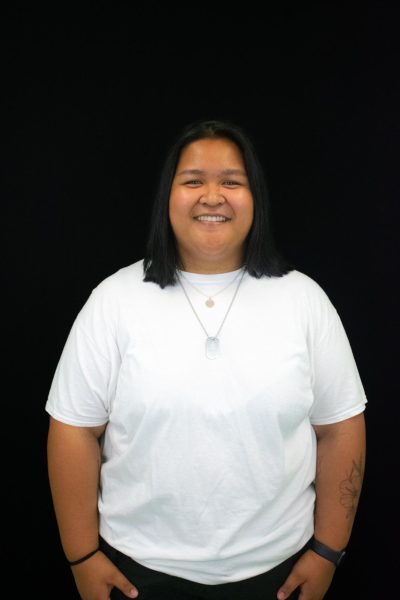For two weeks before midterms this semester, Riley McGuire, a sophomore fine arts major, barely slept three hours a night. That wasn’t unusual, she said, because she has struggled with sleep for years.
She was prescribed sleep medication five years ago, but it made her feel drowsy the next day. “I’d rather not sleep at all than sleep well, then be too tired when I wake up,” McGuire said.
She tried smoking weed more than a year ago, but she still can’t sleep.
In interviews, students reported difficulty falling or staying asleep. Some said they sought medical treatment for their sleep problems. Those who don’t seek medical help typically look for other solutions, including cannabis.
Dr. Bhanu Kolla, a psychiatrist and leading sleep expert at the Mayo Clinic in Rochester, Minnesota, said McGuire’s experience is common in college-aged students. He said students typically don’t prioritize sleep, and many turn to cannabis and alcohol as sleep aids. Kolla said this pattern is concerning as it can be counterproductive when trying to solve sleep problems.
“The use of alcohol, weed – all of that can disrupt sleep, too,” Kolla said. “Those are things to pay attention to try and fix to try to prioritize sleep, avoid excessive use of substances.”
Weed can be an effective temporary sedative but is not a helpful long-term solution, he said. Once the effects of weed wear off, sleep issues might recur. Kolla also said students might build up tolerance to weed and become dependent on the drug.
“It keeps that vicious cycle going,” he said.
Journalism students in the “Investigative Reporting” course this spring surveyed 100 students about their sleep habits from Feb. 20 to Feb. 28 at the Student Center on Columbia’s campus.
The results, which had a margin of error of 9.7% and represented about 2% of Columbia’s student body, aligned with national numbers, though the non-random sampling method likely introduces biases from the Student Center sampling location. A national study by the Center for Advancing Health, a non-profit in Washington that encourages people to engage in their health care, found 73% of U.S. college students experience sleep problems.
In the survey of Columbia students, the most common alternative solution was cannabis: 38% said weed is their main alternative sleep aid.
Michael Bagby, a first-year acting student, said he has had sleep difficulties since he was in middle school and has tried various treatments: melatonin, magnesium, soothing tea and meditation. He said none were helpful – until he turned to weed.
“It has been the most beneficial of everything I’ve tried,” Bagby said.
He said his nighttime routine lacks structure. He frequently remains awake late because of social events and distractions. Although he has discussed his sleep problems with his therapist, he is reluctant to pursue medical assistance.
“I’m somewhat nervous about going to the doctor and hearing them say, ‘You don’t have any problems at all. Simply head to bed,’” he said.
Many students interviewed for this story had not sought professional help for their sleep problems. Most chose to manage the issues themselves.
College students are particularly vulnerable to sleep disturbances due to significant physiological and behavioral changes happening at that time, according to Dr. Phyllis Zee, chief of the Division of Sleep Medicine at Northwestern University.
Zee said it is important to differentiate between temporary insomnia symptoms and what constitutes a true sleep disorder. “If it’s chronic, meaning that it’s occurring more than three times per week, and it’s happening for more than three months, then you have what we call insomnia disorder,” she said.
Prescription medication, she said, should not be the first approach for addressing sleep issues in college students. The first step, she said, is cognitive behavior therapy, which focuses on restructuring thoughts and behaviors contributing to insomnia.
Kolla, the Mayo Clinic expert, agreed. “In college-age kids, I would say it’s going to be a very, very small percentage who end up on medication because almost all these behavior-based treatments are effective.”
He said that although the prevalence of sleep issues among college students has not increased, sleep problems could greatly impact their quality of life.
Adri Gualpa, who was visiting campus recently on a tour, said she received a referral in high school for a sleep specialist after periods of sleepless nights.
“I would lie in bed for hours, completely exhausted but unable to fall asleep. It was happening four or five nights a week,” she said. After months of tracking her sleep habits and doing an overnight sleep study, she was diagnosed with insomnia.
Gualpa was prescribed sleep medication but said it made her drowsy throughout the day.
“It felt like it was just creating another problem for me,” she said. Currently, Gualpa said that she alternates between periods of taking and not taking the medication because it makes her drowsy. She said she is also concerned about becoming dependent on the medication.
College students also experience other health issues, and oftentimes the treatment and symptoms overlap.
“The anti-anxiety medications I take now actually help both conditions somewhat,” Gualpa said. “They don’t completely solve my sleep problems, but they reduce the intensity.”
Sophomore Harper Boice said they have had sleep disturbances due to anxiety and ADHD since they were eight years old. They took clonidine, a high blood pressure medication commonly used to treat ADHD. In the past few years, they stopped taking their medication and started taking melatonin as a substitute.
“There were days where I would run out of [clonidine], and I wasn’t able to get it for a couple days,” Boice said. “I noticed that it actually didn’t affect my sleep at all. If I don’t take it, I just have a headache.”
Boice said medication can assist with sleep, but lifestyle changes can also help. Unlike many students, they decided to prioritize sleep more. Boice said there’s a lack of understanding of sleep disorders, with common advice like, “just go to bed earlier,” being oversimplified.
Research published in the Innovations in Clinical Neuroscience journal found that underlying mechanisms that cause mental health issues like depression and anxiety can also cause insomnia. Zee confirmed the connection between mental health and sleep problems.
The experts and students agreed that colleges and universities should do more to address sleep problems among students. Zee explained how solutions require more than temporary fixes. Students need more than improved sleep routines, they need a change in culture on the importance of sleep health.
“It would be great if there were programs across colleges and universities for the freshman class,” Zee said. “A pamphlet or online resource for sleep, for healthy sleep.”
The Center for Student Wellbeing on Columbia’s campus does not have any specific resources to guide students with better sleep.
The school replaced the on-campus Health Center with a new telehealth program, TimelyCare, at the start of the Fall 2024 semester, as the Chronicle previously reported. TimelyCare is free for students and offers online self-care lessons, including a module titled “Self-Care for Sleep.” The lesson plan focuses on the importance of sleep health, how to track sleep patterns and tips to improve the quality of sleep.
The Center for Student Wellbeing has a Decompression Space for students to unwind and relax between classes. The space has a “chill zone” with bean bags, a sleeping pad, along with pillows and blankets for students to use. The bookshelf across the chill zone is lined with pamphlets about safe sex, Narcan training and other self-care practices. But there are no pamphlets about sleep health.
Copy edited by Patience Hurston
Maya Liquigan is a staff reporter for the Chronicle. Eleanor Lusciatti, Lauren Schmit and Janaya Banks are contributors.
Resumen en Español:
Estudiantes de periodismo en la clase de “Reportaje Investigativo” hicieron una encuesta a 100 estudiantes sobre sus hábitos de dormir. La encuesta fue hecha desde febrero 20 al 28, representa 2% de Columbia, y tomó lugar en el Centro Estudiantil.
Muchos estudiantes en la encuesta reportaron dificultad en dormir o quedarse dormidos. Algunos buscaron tratamiento médico mientras otros usaron soluciones como el canabis.
Una encuesta nacional reportó que 73% de estudiantes de universidad han tenido problemas durmiendo.
Columbia ofrece TimelyCare, es un programa digital de salud que ofrece un plan de lecciones sobre cómo mantener la salud de descanso. Similarmente, está el Espacio de Descompresión, un lugar donde los estudiantes pueden relajarse entre clases.
Estudiantes y expertos médicos han dicho que se necesita un cambio cultural sobre la importancia de la salud de descanso al igual que mejores soluciones.
Resumen en Español por Uriel Reyes
Resumen editado por Manuel Nocera










